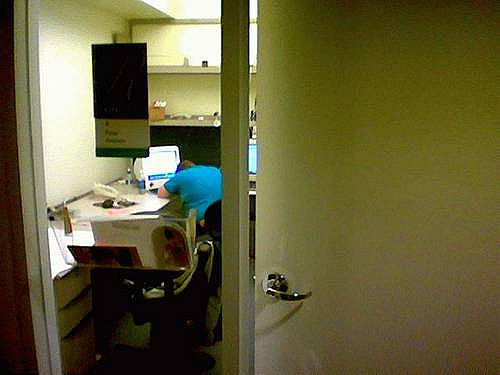
Co-worker asleep
Originally uploaded by ldandersen.
After struggling to drag my sleepy self onto the bus to work this morning, my daily paper greeted me with a headline admonishing that If you slept till 5:30 this morning, you slept in. What followed in the article below was a litany of boasts from manic workaholics:
He allocates 60 hours for work, 45 for sleep (he often naps from 5:30 to 6:30 a.m. and catches up on weekends), 21 for family, seven for meditation, seven for family finance, seven for volunteering and four for exercise. Seventeen hours a week are “flex time.”
“They say what gets measured gets improved,” he said.
Mr. Jamal is one of many Canadians who are sleeping less and waking earlier to tackle heavy workloads, gain a competitive edge or squeeze in exercise.
Indeed, snoozing until dawn, it seems, is for losers. Waking when the rooster crows “means simply running with the pack,” The New York Times noted wryly in a recent article that dubbed getting up before dawn “competitive waking.”
As Donald Trump, who goes to bed at 1 a.m. and rises at 5 a.m., wrote in Think Like a Billionaire: ” . . . it gives me a competitive edge. I have friends who are successful and sleep ten hours a night, and I ask them, ‘How can you compete against people like me if I sleep only four hours?’ It rarely can be done. No matter how brilliant you are, there’s not enough time in the day.”
And they’re passing the lifestyle onto others:
As many a subordinate knows, when a boss has a BlackBerry — often called CrackBerrys because they are so addictive — attached to the hip, he or she will use it.
When Susan Murray awakes at about 6:15 a.m., she counts on a handful of waiting messages from her boss, federal Public Works Minister Scott Brison. Knowing he is an early riser makes Ms. Murray, his communications director and “not a morning person,” get up earlier than she otherwise would.
Mr. Brison said he wakes up at 4:40 a.m., but added: “I don’t know if it’s that early.” At his office, he reads a stack of newspapers and fires off messages to his staff. He then works out in the House of Commons gym, and between 6 a.m. and 7 a.m., begins hearing back from his staff.
“I do think that the team only runs as fast as the leader of the team. I set a pretty fast pace,” said Mr. Brison, who usually goes to bed at about 10:30 p.m. and steals a 15-minute nap during the day.
When he was chief executive officer of Rogers Cable, John Tory, now Leader of the Ontario Progressive Conservative Party, noticed that his employees began arriving earlier because they knew he started work at 6:15 a.m.
“There was no question some of the hours changed, and look, I caused that to happen a bit because I would schedule meetings” at 7 a.m. or 7:30 a.m. After he left the company, people made sure to tell him the early schedule had been shelved.
A tyranny of the obsessed. If this sort of circadian madness is posited as a miracle cure to boost productivity, then we know our culture of work has gone off the rails.
To be fair, the article quotes a few disapproving doctors and researchers who have documented the ill-effects for a culture that is already not getting enough sleep:
“We’re deluding ourselves into thinking we can squeeze more out of the day by burning the candle at both ends,” said Jeffrey Lipsitz, medical director of the Sleep Disorders Centre of Metropolitan Toronto.
Today’s hyper-connected, 24-hour, seven-days-a-week society is a key reason people on all rungs of the ladder are cutting back on rest. Although doctors once told patients to seek refuge in a book if they were tossing and turning, they now admonish people to refrain from taking to bed laptops or BlackBerry e-mail devices and personal digital assistants.
“When you stop to think about it, is it any wonder that people are so wired, literally and figuratively?” Dr. Lipsitz asked. [Emphasis added]
But overall, I’d say that the article’s tone is one of admiration for these hard-charging go-getters, who have triumphed over limitations of the flesh. It’s easy to overestimate the significance of pieces like these, but it ties in to so many of my own frustrations and fears about the hidden costs of contemporary working life. Most people I know are working extraordinarily hard, often to the detriment of their emotional and physical well-being — and I would argue to the detriment of their work as well. Could I have been the only tired commuter for whom the front page really read: “Rev it up, because your competition never sleeps”?


Hey Brian,
I rarely comment or link over here, but I’m always enjoying your writing. This post is particularly yummy.
Cheers,
Jeremy